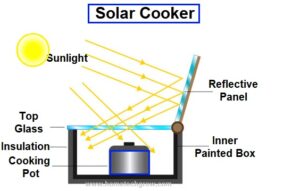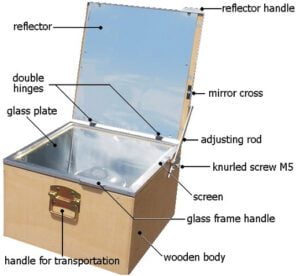Scope of Solar cooking
- With the increasing concern over the environment and the need for sustainable living, the use of solar stoves has become a popular choice for many
- Solar stoves are a simple and effective way to cook food using renewable energy from the sun. In this blog post, we will discuss what a solar stove is, how it works, and its benefits.

What is a Solar Stove?
- A solar stove, also known as a solar cooker or solar oven, is a device that harnesses the power of the sun to cook food. It works by reflecting and concentrating sunlight onto a cooking vessel, which is then heated to cook food
- There are several different types of solar stoves, including box cookers, parabolic cookers, and panel cookers. Box cookers are the simplest and most common type, consisting of an insulated box with a transparent lid and reflectors to direct sunlight into the box.
How does a Solar Stove work?
- The working principle of a solar cooker is based on the greenhouse effect. The transparent lid or cover of the cooker allows sunlight to enter, but traps the heat inside, creating a warm and humid environment. The reflectors are designed to direct sunlight into the cooking vessel, which absorbs the heat and cooks the food
- Solar cookers work best on sunny days with clear skies. The cooking time depends on the type of solar cooker and the amount of sunlight available. It can take anywhere from 30 minutes to several hours to cook food in a solar cooker, depending on the type of food and the amount of sunlight available.
- Solar stoves work by using the energy from sunlight to heat up a cooking vessel. The reflectors on the solar stove are designed to concentrate sunlight onto the cooking vessel, which absorbs the heat and cooks the food
- The cooking vessel in a solar stove can be made of a variety of materials, such as metal or glass, depending on the type of solar stove being used. The insulation in the box cookers helps to keep the heat inside the cooking vessel, which further enhances the cooking process.
Types of Solar Cookers
- A solar cooker, also known as a solar oven, is a device that uses the energy from sunlight to cook food
- It works by concentrating sunlight onto a cooking vessel, which is then heated to cook food. There are three main types of solar cookers: box cookers, parabolic cookers, and panel cookers.
Box Cooker
- Box cookers are the most common type of solar cooker and are typically made of an insulated box with a transparent lid and reflectors to direct sunlight into the box
- The cooking vessel is placed inside the box and absorbs the heat from the sun
- The insulation in the box helps to keep the heat inside and prevent heat loss. The temperature inside a box cooker can reach up to 300°F (149°C), which is sufficient for cooking most foods.
Parabolic Solar Cooker
- Parabolic cookers are shaped like a satellite dish and focus sunlight onto a central point, where the cooking vessel is placed
- They are capable of producing high temperatures and are ideal for cooking foods that require high heat, such as stir-fries or sautés.

- A parabolic solar cooker is a type of solar cooker that uses a parabolic reflector to focus sunlight onto a cooking pot or pan, creating high temperatures and allowing for quick and efficient cooking. The reflector is shaped like a parabola, which is a three-dimensional curved surface that reflects and concentrates sunlight onto a central point.
- Parabolic solar cookers can reach temperatures of up to 400°F (204°C), which is much higher than other types of solar cookers. This makes them ideal for cooking foods that require high heat, such as stir-fries, sautés, and even baking.
- The working principle of a parabolic solar cooker is similar to that of other types of solar cookers. The parabolic reflector collects and concentrates sunlight onto a central point, where the cooking vessel is placed. The cooking vessel absorbs the heat and cooks the food.
- There are two types of parabolic solar cookers: fixed and portable.
- Fixed parabolic solar cookers are typically large and stationary, and are designed to be used in one location.
- Portable parabolic solar cookers, on the other hand, are smaller and more lightweight and can be easily transported and set up in different locations.
- To use a parabolic solar cooker, it is important to position it correctly so that it is facing the sun. The reflector should be adjusted to focus the sunlight onto the cooking vessel, and the cooking vessel should be placed in the central point of the reflector.
- Parabolic solar cookers are ideal for outdoor activities such as camping, picnics, and barbecues. They are also useful for emergency preparedness and in areas where access to electricity or other types of fuel is limited. They are an environmentally friendly and sustainable way to cook food, and can help reduce our reliance on fossil fuels.
- Overall, parabolic solar cookers are an efficient and effective way to cook food using renewable energy from the sun
- They are capable of producing high temperatures and are ideal for cooking foods that require high heat. With its many benefits, parabolic solar cookers are a great investment for anyone looking to reduce their carbon footprint and live a more sustainable lifestyle.

Panel Cooker
- Panel cookers consist of a reflective panel that is angled to reflect sunlight onto a cooking vessel
- They are lightweight and portable, making them ideal for camping or outdoor activities.

Benefits of Solar Stoves
Using a solar stove has several benefits, including:
- Environmental Benefits: Solar stoves are a clean and renewable source of energy that do not emit any harmful greenhouse gases or pollutants.
- Cost Savings: Once you have invested in a solar stove, there are no additional fuel costs. You can cook your food for free using the power of the sun.
- Health Benefits: Using a solar stove eliminates the need for burning wood or charcoal, which can produce harmful smoke and fumes. This is particularly important in developing countries where indoor air pollution from cooking fires is a major health hazard.
- Convenience: Solar stoves are easy to use and require little maintenance. They can be used anywhere there is sunlight, making them ideal for outdoor activities such as camping or picnics.
- solar stoves are an excellent way to cook food using renewable energy from the sun. They are a clean, cost-effective, and convenient alternative to traditional cooking methods.
- With their many benefits, solar stoves are a great investment for anyone looking to reduce their carbon footprint and live a more sustainable lifestyle.
Summary
- solar cookers are an environmentally friendly and sustainable way to cook food using renewable energy from the sun. They are simple, easy to use, and require no fuel, making them an excellent option for outdoor activities, camping, and emergency preparedness. With their many benefits, solar cookers are a great investment for anyone looking to reduce their carbon footprint and live a more sustainable lifestyle



